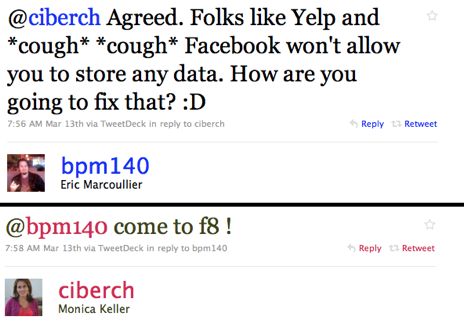 Facebook’s f8 conference is shaping up to have quite a few improvements in store for developers, and we think we’ve come across another one: a change to Facebook’s data retention policy. Yesterday, Facebook employee Monica Keller (who left MySpace to join the company last month), took part in a conversation on Twitter that seemed to indicate that developers may no longer have to delete user data. The possible change came to light after Gnip CEO Eric Marcoullier gently chided Keller about developers being unable to store any user data, to which she responded, “come to f8!”.
Facebook’s f8 conference is shaping up to have quite a few improvements in store for developers, and we think we’ve come across another one: a change to Facebook’s data retention policy. Yesterday, Facebook employee Monica Keller (who left MySpace to join the company last month), took part in a conversation on Twitter that seemed to indicate that developers may no longer have to delete user data. The possible change came to light after Gnip CEO Eric Marcoullier gently chided Keller about developers being unable to store any user data, to which she responded, “come to f8!”.
Since that tweet, we’ve heard further whispers about a change to Facebook’s 24 hour policy retention, and that Facebook is already briefing developers on the upcoming changes.

So why does this matter? Facebook has historically been quite restrictive with regard to what developers are allowed to do with user data; in particular, it only allows developers using Facebook Connect to store user data for 24 hours before they have to delete it, or ping Facebook’s servers for a refresh. There are some exceptions to that rule (you can get a sense for them here), but the majority of the ‘meaty’ content can’t be stored by developers. As a result, applications have to constantly connect with Facebook’s servers, which multiple developers we’ve spoken with say is very inefficient.
If Facebook does extend that 24 hour window, developers would be able to do things that generally require locally stored data, like batch processing (this isn’t feasible now because the application would have to make an API call for each user). Likewise, if these applications had the data stored locally they would be able to boost load speeds because they wouldn’t have to wait for a call to Facebook’s servers after their applications loaded.
Of course, such a change would also have privacy implications (we’ll wait until we have all the details before we analyze those). That said, we’ve also heard that many developers simply ignore some of Facebook’s data retention policies, in part because Facebook has a very hard time enforcing them. So it’s unclear just how big an impact this would have on the applications being developed.